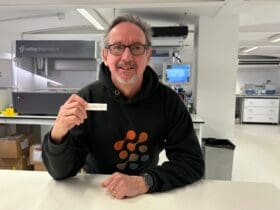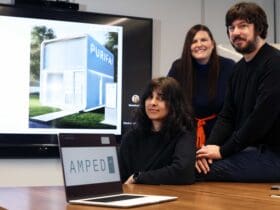A WOMAN who survived a cardiac arrest has been reunited with some of the people who saved her life.
When Sian Andrews, 73, collapsed at her home in Cardiff, her sister Ceri Andrews phoned 999 which triggered the Cardiac Responder app GoodSAM.
While Teagan Landeg, a call handler for the Welsh Ambulance Service coached Ceri through cardiopulmonary resuscitation (CPR), GoodSAM sent a notification to Richard Jones, an off-duty Volunteer Community First Responder (CFR).
The GoodSAM app alerts people trained in basic life support to cardiac arrests in their immediate vicinity, allowing CPR to start in the vital minutes before an ambulance arrives.
Ceri said: “As I rang 999 and described the situation, Teagan told me to open the front door of the flat.
“I went back up the stairs and she very calmly talked me through CPR.
“Before I knew it, Richard was walking through the door and took over.”
Real estate agent Richard, who doubles as a CFR for the Welsh Ambulance Service and is signed up to GoodSAM, arrived on scene in under five minutes.
He said: “I was just getting ready to go into the office when I heard the notification on my phone.
“I grabbed my keys and headed straight over to Sian’s flat which happens to be a few streets away.
“I walked straight up the stairs, attached a defibrillator to Sian and continued CPR until help arrived.
That support came in the form of four staff from the Welsh Ambulance Services NHS Trust, and two colleagues from the Emergency Medical Retrieval and Transfer Service (EMRTS).
When the Wales Air Ambulance Charity helicopters are unable to fly, EMRTS Cymru has access to a fleet of Rapid Response Vehicles, where highly skilled consultants and critical care practitioners carry some of the most pioneering medical equipment in the world.
Marc Frowen, Critical Care Practitioner for EMRTS said: “When we arrived CPR was still ongoing, so we quickly applied a mechanical chest compressions device, called a LUCAS to Sian.
“After more medical intervention, Sian did eventually start breathing on her own, so we put her on a ventilator to optimise oxygenation.
“As it was a very tight working space, along with the staircase being very narrow we had a tricky job getting Sian downstairs with all the equipment attached to her.
“But once on the back of the WAST ambulance, it was a relatively short transit to A&E resus.”
Overall, Sian was given four shocks of a defibrillator before being taken to the University Hospital of Wales, Cardiff.
Ceri said: “It was six weeks of agony.
“I would try to visit her everyday with our two brothers, only having two days off a week.
“I was told she was the sickest person on the ward.
“And then one day I went to visit her, and she was propped up with her glasses on just looking at me.”
Sian spent 59 days in the intensive care unit and a further 16 days in hospital.
Sian said: “Although I’ve had problems with my blood pressure, health-wise I’ve had a boring life having only been in hospital for tennis elbow and breaking my toe.
“This ordeal I wouldn’t wish on anyone, but it has given me a new meaning of life.
“I am unbelievably gratefully to my sister, who not only started CPR but sat by my side throughout my hospital stay.
“I cannot thank the first responder, paramedics, EMRTS and hospital staff enough, they are all amazing – they are all angels.”
When someone has a cardiac arrest, they collapse and become unresponsive.
They either stop breathing entirely, or they may take gasping or infrequent breaths for a few minutes, which can be misinterpreted as snoring.
If you see someone having a cardiac arrest, phone 999 immediately and start CPR.
In addition, a defibrillator will deliver a controlled electric shock to try and get the heart beating normally again.
Ambulance call handlers will tell you where your nearest defibrillator is.
The Welsh Ambulance Service continues to work in partnership with Welsh Government and third sector partners to strive to deliver the Out of Hospital Cardiac Arrest Plan in Wales.









Leave a Reply
View Comments